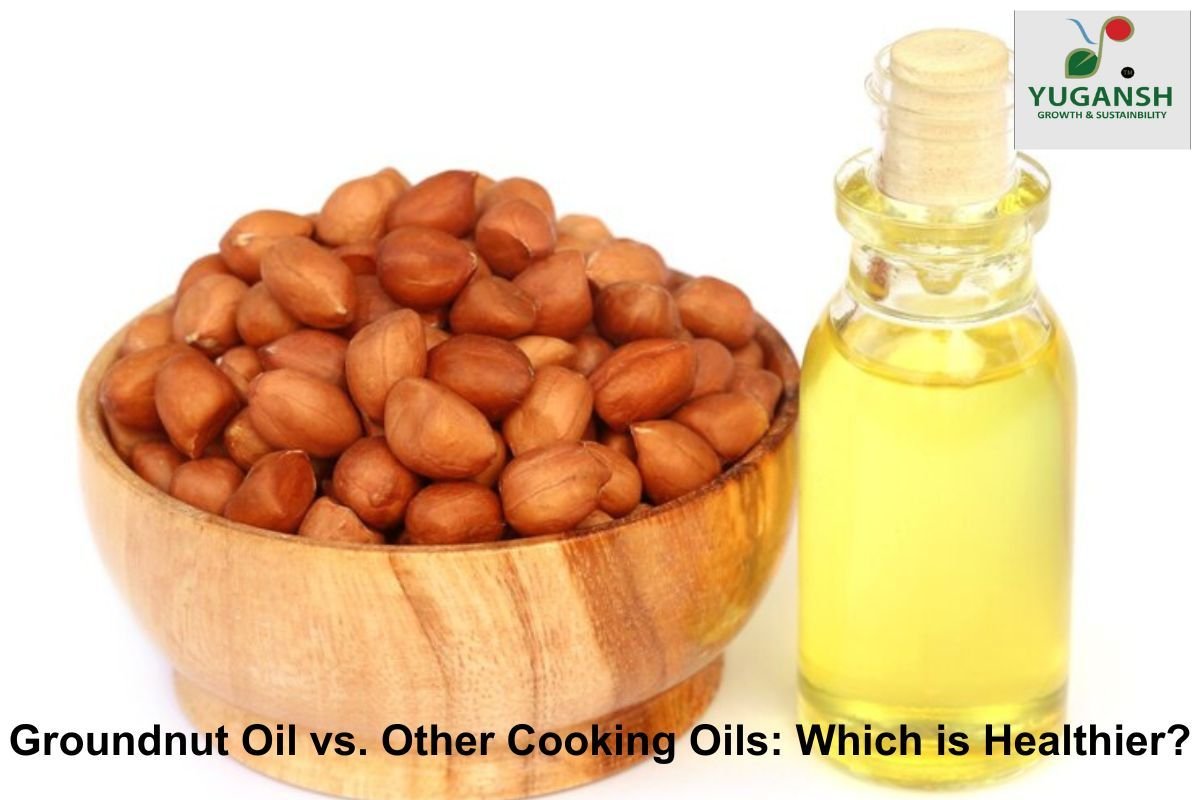Cooking oils are undoubtedly a part of our daily food. More importantly, they add flavor, moisture, and nutrition; not all oils, however, possess these to the same extent. Let us compare groundnut oil with other popular cooking oils and see which one is healthier.
What is Groundnut Oil?
Peanut oil or groundnut oil is extracted from peanuts. It’s one of those oils very widely used within Asian and African curries. The flavour is fairly mild whereas the smoke point is extremely high, so it’s generally suitable for deep frying.
However, cold-pressed peanut oils are extracted without the application of heat; hence most of the nutrients are retained during the production process. This will ensure retention of the essential fatty acids and vitamins in the oil. Cold-pressed oils have generally a fuller flavour and nutrient content.
Nutritional Profile of Groundnut Oil
Groundnut oil is rich in monounsaturated fats. Monounsaturated fats are healthy fats for the heart. They reduce the bad cholesterol in the body. They improve heart health and have low risks of developing some heart conditions.
Moreover, groundnut oil also has vitamin E-an antioxidant. Antioxidants control the activities of free radicals that kill cells. Groundnut oil is not saturated with fats also, which makes it much healthier than some other oils.
Comparing Groundnut Oil with Other Popular Oils
Each oil type offers unique health benefits. Here’s how groundnut oil compares to other oils:
Mustard Oil
Kachi Ghani mustard oil is widely used in most Indian kitchens. It is flavoured, aromatic, rich in omega-3 fats, reduces inflammation and improves heart health. It also has antibacterial properties that help with digestion.
However, the flavour of mustard oil is too strong for some recipes and not desired by everyone. Some like the flavour, while others don’t like it, so it may not suit every recipe.
Olive Oil
Olive oil is also known for heart health. Its fatty acid composition is mainly monounsaturated, just like groundnut oil. Cold-pressed extra-virgin olive oil contains antioxidants but has a lower smoke point than groundnut oil.
Olive oil is also not the best fit for high heat application. Use olive oil only when dressing salads or gentle cooking.
Coconut Oil
Coconuts have a distinct flavour, a certain feel and textural sense. The saturated fat nature of coconut oil is a high percentage and thus not too healthily related to heart health. However, there are a few medium-chain triglycerides that would enhance metabolism.
Coconut oil does not make for good frying oil while it’s perfect for baking and frying though. Groundnut oil balances the fats better.
Sunflower Oil
This sunflower oil is light in flavour and lighter. Rich in vitamin E and omega-6 fats. While these are both necessary, both should be balanced by a good amount of omega-3 intake. Omega-6 can be pro-inflammatory if taken to excess.
While sunflower oil would work for just about everything. The use of cold-pressed groundnut oil may be the better option between the two.
Benefits of Cold-Pressed and Wood-Pressed Oils
Cold-pressing and wood-pressing oil preserve the nutrients and flavour content. These are naturally extracted oils which do not use high heat to extract their content. However, the slow process of extraction preserves antioxidants and essential fatty acids. Wood-pressed oil is kind of the same, made through traditional wooden equipment.
Cold-pressed groundnut oil and kachi ghani mustard oil are two examples. These have more nutritional benefits than refined oils. Most nutrients are lost while manufacturing the refined oils. Additionally, there might be the presence of harmful chemicals because of the refining processes.
Which Cooking Oil is the Healthiest?
The healthiest oil depends on your cooking needs. Here are some considerations:
For High-Heat Cooking: It’s really quite good quality groundnut oil for very hot cooking due to its high smoke point.
For Heart Health: All of these oils like olive oil, mustard oil, and groundnut oil are heart-friendly for heart health.
For Antioxidants: Cold-pressed groundnut oil and extra-virgin olive oil are the favourites for antioxidants.
Each has its good and bad sides, but cold-press oil tends to give more nutrients and fewer chemicals.
How to Choose the Right Oil for Your Needs?
Choose the appropriate oil for your diet, cooking, and health goals. Here is a quick reference list:
Flavour Preference: A light flavour calls for groundnut oil; a strong flavour by using mustard oil when preferred.
Cooking Method: Fry in groundnut oil or sunflower oil; drizzle dressing on salads.
Health Needs: Opt for cold-pressed or wood-pressed oils to increase the nutrient value.
Final Thoughts
Groundnut oil is healthy as it contains balanced fats. More nutrients are retained in the cold-pressed groundnut oil. It’s the best one, sure. But it’s nice to have one or two oils in the house.
Rotating the oils will help you achieve a balance between the fats and the nutrients. Even your general health would be more benefited with using cold-pressed or wood-pressed oil.


